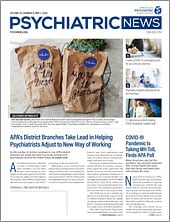Inpatient psychiatric units all over the country are grappling with the need to continue treating patients in the midst of the COVID-19 pandemic. On April 1, APA and the National Association for Behavioral Healthcare hosted a webinar with the leaders of three inpatient facilities so they could share their experiences so far.
Speakers were Harsh Trivedi, M.D., M.B.A., president and CEO of Sheppard Pratt Health Systems in Maryland; Ryan Kimmel, M.D., chief of psychiatry at the University of Washington Medical Center; and Frank A. Ghinassi, Ph.D., A.B.P.P., president and CEO of Rutgers University Behavioral Health Care. APA Education Director Tristan Gorrindo, M.D., moderated the webinar.
The speakers stressed the importance of psychiatric facilities addressing COVID-19 in a way that does not limit people’s access to behavioral health care. “We’re seeing increasingly the need to treat people who have, in fact, tested positive [for the virus],” Ghinassi said.
Patients in the emergency department (ED) who are there for behavioral health reasons “still have an acutely higher risk of death from suicide than they do from coronavirus,” Kimmel said.
“We’re trying not to reduce our inpatient psychiatry footprint,” Kimmel continued. “If anything, we’re trying to increase it.”
The speakers outlined strategies they’ve adopted to deliver psychiatric care during the COVID-19 crisis, including the following:
•
Setting up remote services wherever possible: The participants explained that their systems have worked to rapidly provide outpatient services through telemedicine. Trivedi said Sheppard Pratt is working to launch a virtual assessment service for patients in crisis. When patients on inpatient wards test positive for COVID-19, Ghinassi said his staff use video technology to allow patients to participate in educational and group activities from their rooms.
•
Preparing for patients who need seclusion and restraint: Trivedi said his system has taken steps to prepare for cases in which patients who are COVID-19 positive require seclusion or restraints. The protocol for these patients includes steps to ensure all staff use the appropriate personal protective equipment (PPE). “We are making plans for what to do in that situation long before we’re in that situation, so staff are prepared and know what to do,” he said.
•
Restricting outside visitor access: Ghinassi said his system’s inpatient units and screening facilities have stopped allowing visitors. The only plausible exception to this protocol is pediatric patients, some of whom are as young as 6 or 7, and for whom visitors are allowed on a case-by-case basis. “As difficult as it is, we have not allowed more than one or two of those visits to actually happen,” he said. “We are making ample access to video technology … to allow the parents to visit virtually, but visiting has, for all practical purposes, ceased on any of our units.” The system has also started doing temperature scans of everybody who comes in and out of the buildings on a daily basis, Ghinassi said.
•
Using PPE selectively: Typically, on inpatient psychiatric units, plastic biohazard bags or PPE supplies that could be used as ligatures must be stored where patients cannot access them, Kimmel explained.
“On our inpatient unit we’ve had to develop systems where inside the patient’s room is a locking closet, to which the staff has a key but the patient doesn’t, where we store some of the supplies and the biohazard bags,” he said.
•
Supporting staff: Trivedi, Kimmel, and Ghinassi all spoke of the importance of providing staff with regular updates on new information learned and changes taking place in response to COVID-19. Information from the Centers for Disease Control and Prevention and local departments of health changes rapidly, they said, and strong lines of communication with staff are vital.
“If people feel uninformed, they somehow feel information is being withheld or they’re being left out of the loop,” Ghinassi said. Even if people don’t agree with the changes, he continued, receiving regular updates helps them feel that they’re part of the process.
Trivedi pointed out that health care has a hero culture in which one person tends to take on all responsibilities alone. But in the age of COVID-19 when anybody can get sick, his health system has emphasized the importance of logistical conversations to determine who can cover a staff member’s duties if he or she becomes sick.
Kimmel said that the University of Washington Medical Center has set up a peer-to-peer program to offer support to staff and is anticipating ways in which to help after the COVID-19 crisis ends.
“We are all human beings, and we are all relationship based,” Trivedi said. “Within our messages we ask: How do we take the time to support one another?” ■

